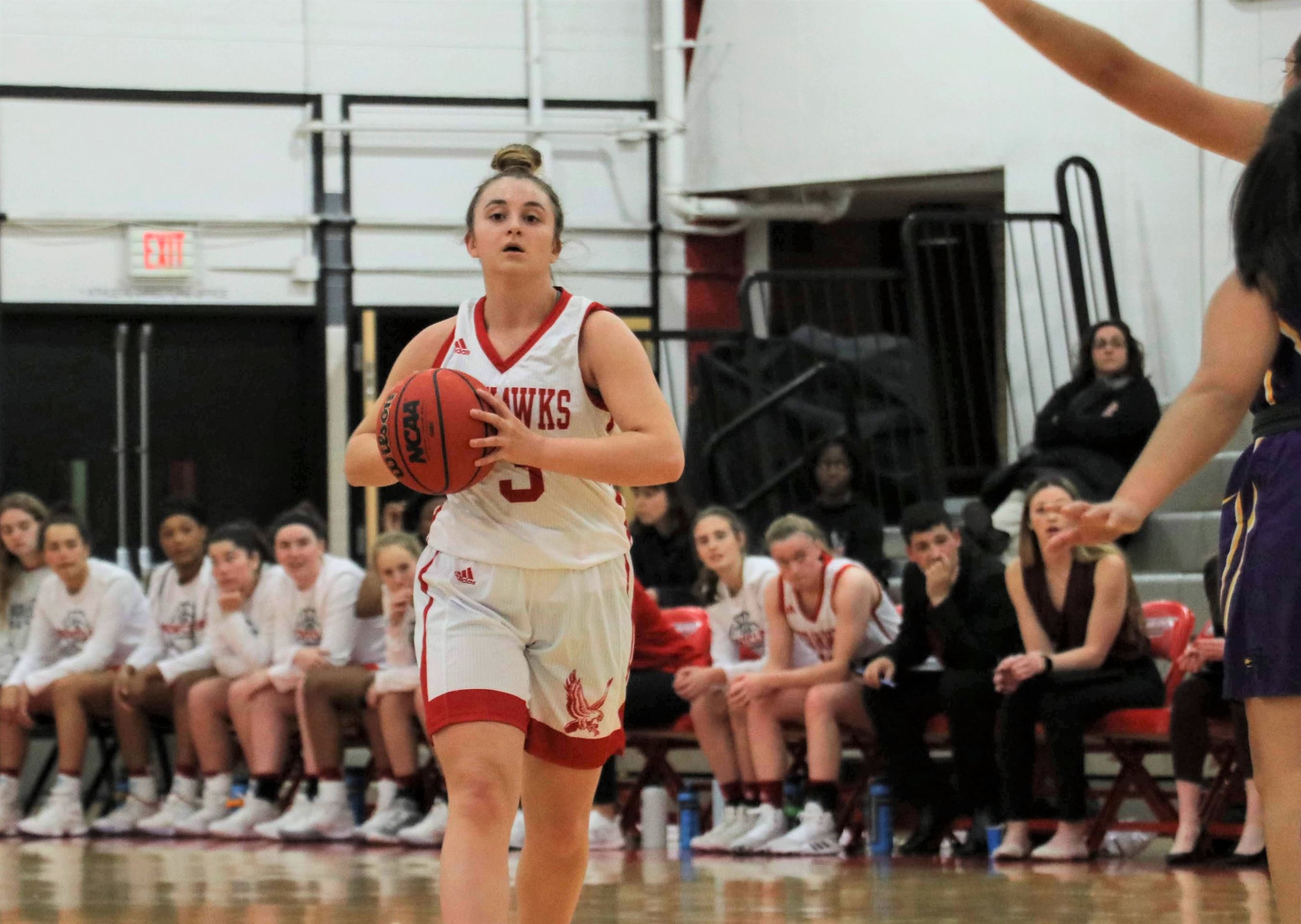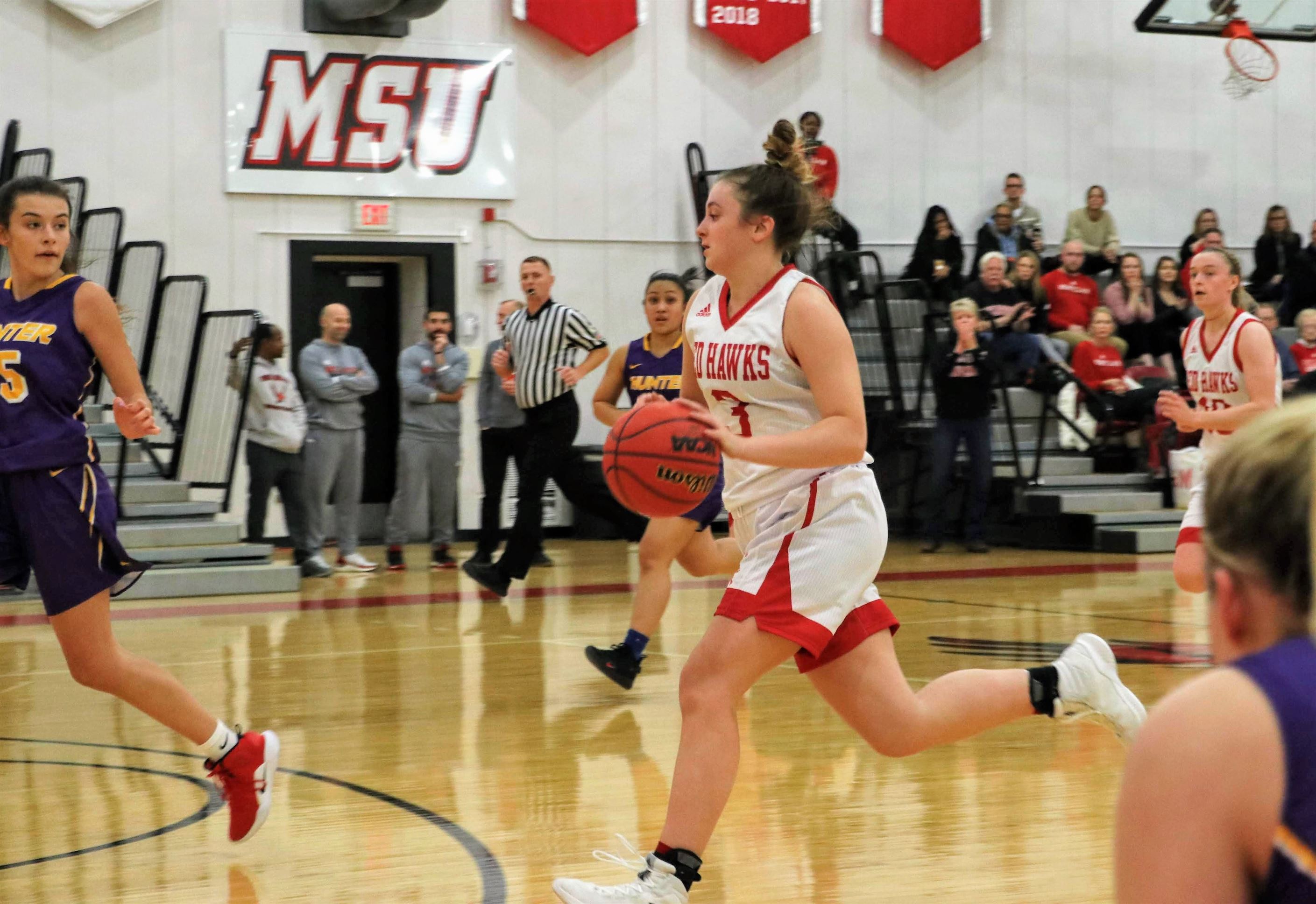Montclair State University women’s basketball guard, Julia Sutton, had high expectations for herself coming into the 2019-2020 season. After primarily coming off the bench last year, Sutton earned a starting role on the team and was looking forward to a breakout season.
In the second game of the season, the chances of Sutton, a junior communication and media arts major at Montclair State, continuing to play quickly evaporated. Sutton would suffer from a freak injury during the game.
“We were in Connecticut for the Trinity College Tip-Off Tournament, and it was our first game of the tournament,” Sutton said. “Two minutes into the game, I was running sideways and some girl just hit me straight onto my knee, and I heard my ACL pop and I fell to the floor. Everyone kept saying it was going to be okay, but I looked over to our assistant coach Katie Sire and I was like, ‘I just tore my ACL.’”
The injury was so bad that Sutton was not able to walk off the court. Although the trainers at the tournament never gave her the official diagnosis, Sutton believes that they knew the extent of the injury.
Head coach Karin Harvey drove Sutton to the doctor after the team had returned from Connecticut to get the official word on the injury. The results were just what she expected: a torn ACL.
Just like that, Sutton’s season was done. Even as the Red Hawks would go on to win 21 games and reach both the New Jersey Athletic Conference (NJAC) Championship Game and NCAA Tournament, Sutton would have to support her team from the sideline.
For her entire basketball career, Sutton had remained relatively healthy, as the worst injury she had suffered thus far in her career was a broken finger. She had never torn a ligament or broken a major bone, let alone torn her ACL. Being injured and not having the ability to help her team on the court was a painful reality for Sutton.
“The mental barrier was the hardest part,” Sutton said. “My team had such a great season and I wanted to help them on the court as much as possible but I just couldn’t. I didn’t get my surgery until a month after the injury, so I was sitting in this constant mindset that I couldn’t really do anything.”
Sutton would eventually undergo surgery and begin her rehab soon after. Not long after, her perspective on the injury changed. The mental barrier that she was fighting was gone.
“I learned the game from a completely different perspective, more from the coaching side of things,” Sutton said. “I would encourage my teammates and help them with whatever they needed, but also go to them if they were struggling in a different way than what the coach could’ve because I am still a player and they look at me differently.”
Seeing the game from a coach’s perspective could be a huge bonus for Sutton this upcoming season. Her expanded knowledge of the game could potentially make her a players’ coach on the court.
Typically, you would not see this type of player at the collegiate level often, but Sutton may be a rare case. Understanding the adjustments and game strategies that the coaches are pointing out during a game and clarifying it even more so that her teammates can understand is a very underrated skill.
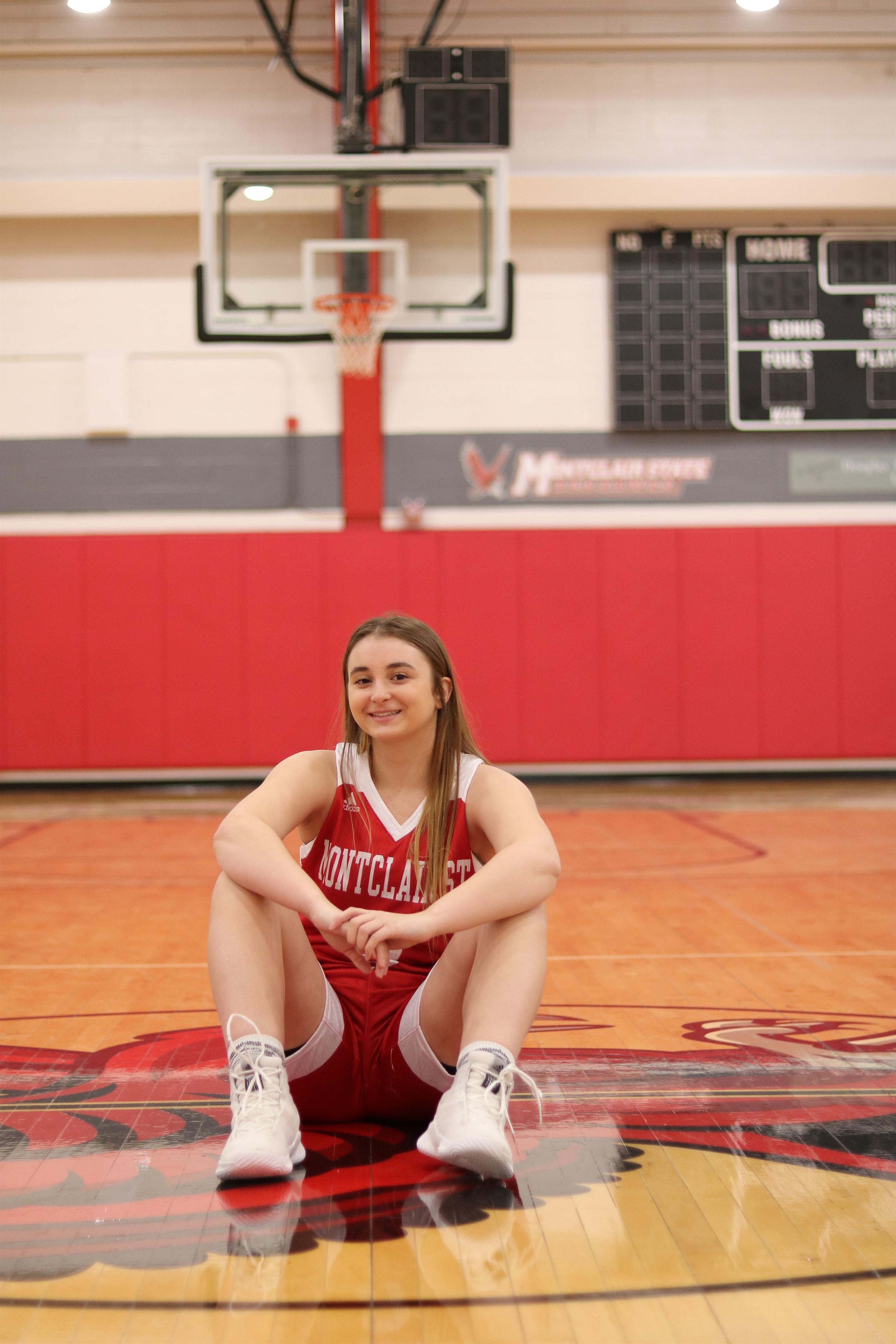
Julia Sutton poses on the Montclair State basketball court at Panzer Gym.
Photo courtesy of Julia Sutton
Harvey was extremely impressed with the way Sutton stayed involved with the team after her injury and believes she was a huge help for last season.
“She continued to support the team and continued to be involved in practices and games [all season],” Harvey said. “She wanted what was best for the team as a whole even though she couldn’t participate. Mentally, it can be challenging but she showed a lot of strength and courage. This showed what a team player she was.”
Throughout the rehab process, Sutton kept her Instagram followers updated with her progress, from Instagram stories of her going through physical therapy to videos of her back on the court practicing.
Rehabbing from any major ligament tear takes an extreme amount of commitment and work ethic, and Sutton’s situation is no different. She even had to re-learn basic things in life.
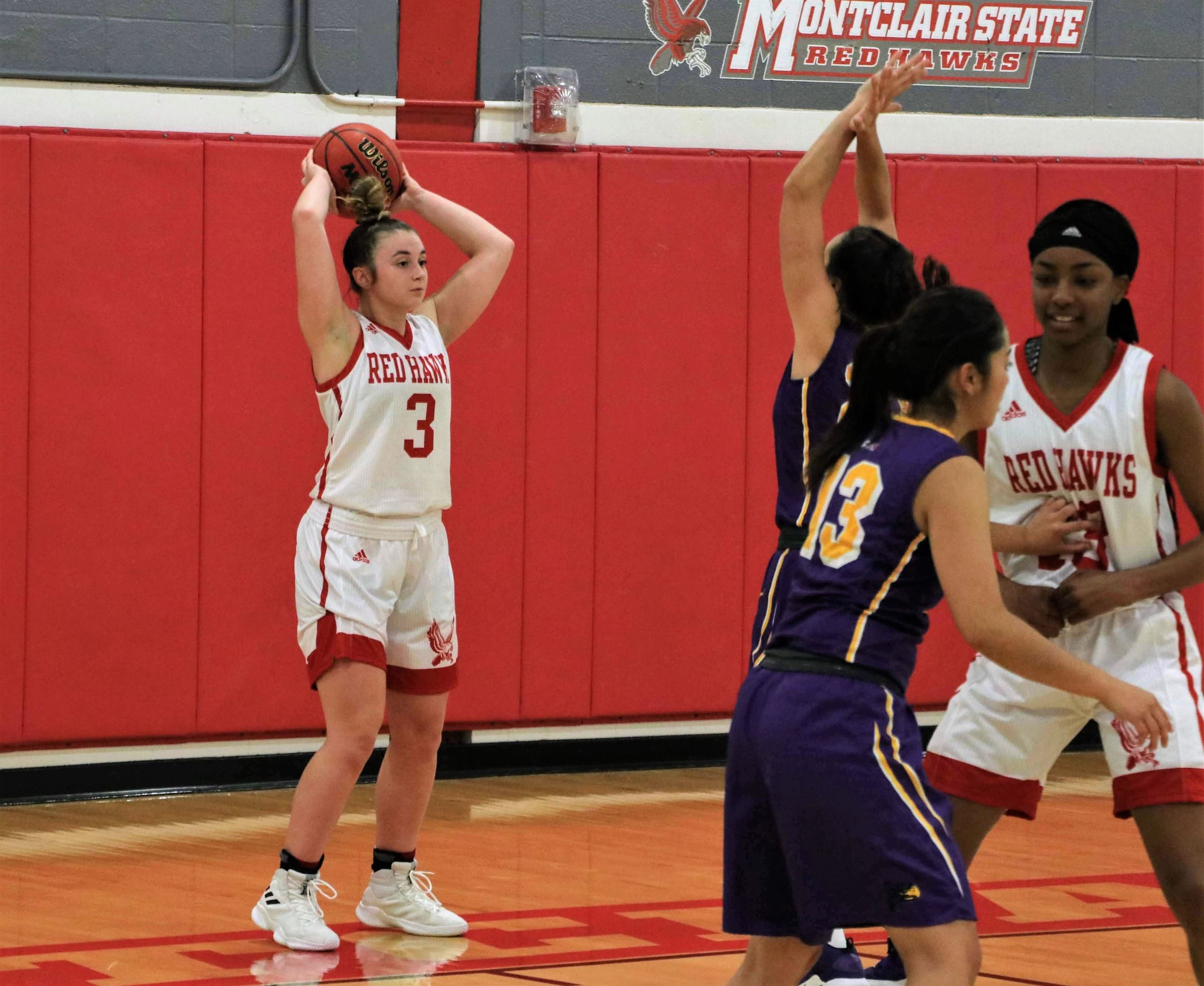
Sutton scans the court for an open teammate to inbound the ball to against Hunter College, early in the 2019-2020 season.
Ben Caplan | The Montclarion
“The first two weeks of rehab was just learning how to walk again,” Sutton said. “[Along with] running and walking, I also had to learn how to do the same [exercises] that I tore my ACL doing. The biggest thing for me is pivoting and running sideways, and I’m still not 100%, so I’m still working on that. I’m also learning how to jump up and land again so you don’t wobble your knee, along with hand strength.”
An important part of her recovery has been strengthening the ACL in her other leg, which could be at risk this season.
“My trainer [Tara Temple] definitely told me to work on both knees,” Sutton said. “It’s not just one knee, you have to train both knees for nine months. A re-injury can happen because your right knee will be good, then you go out and tear your left ACL because it’s not as strong.”
Recently, Sutton was cleared to compete in the upcoming 2020-2021 season, despite the coronavirus pandemic putting their season at risk. Despite all the unknown facing this team, Sutton believes that their goals are still the same.
“We definitely want the NJAC,” Sutton said. “It’s been a tradition at Montclair [State] for a while, and we’ve been building up to this point. Players like Taylor Brown and Kayla Bush have played with some of the best players in [school history]. Nickie Carter had an amazing freshman season and I’m so grateful to have been able to see it. We are all so good and comfortable with each other, and whatever we get out of this season we’ll make the best out of it.”
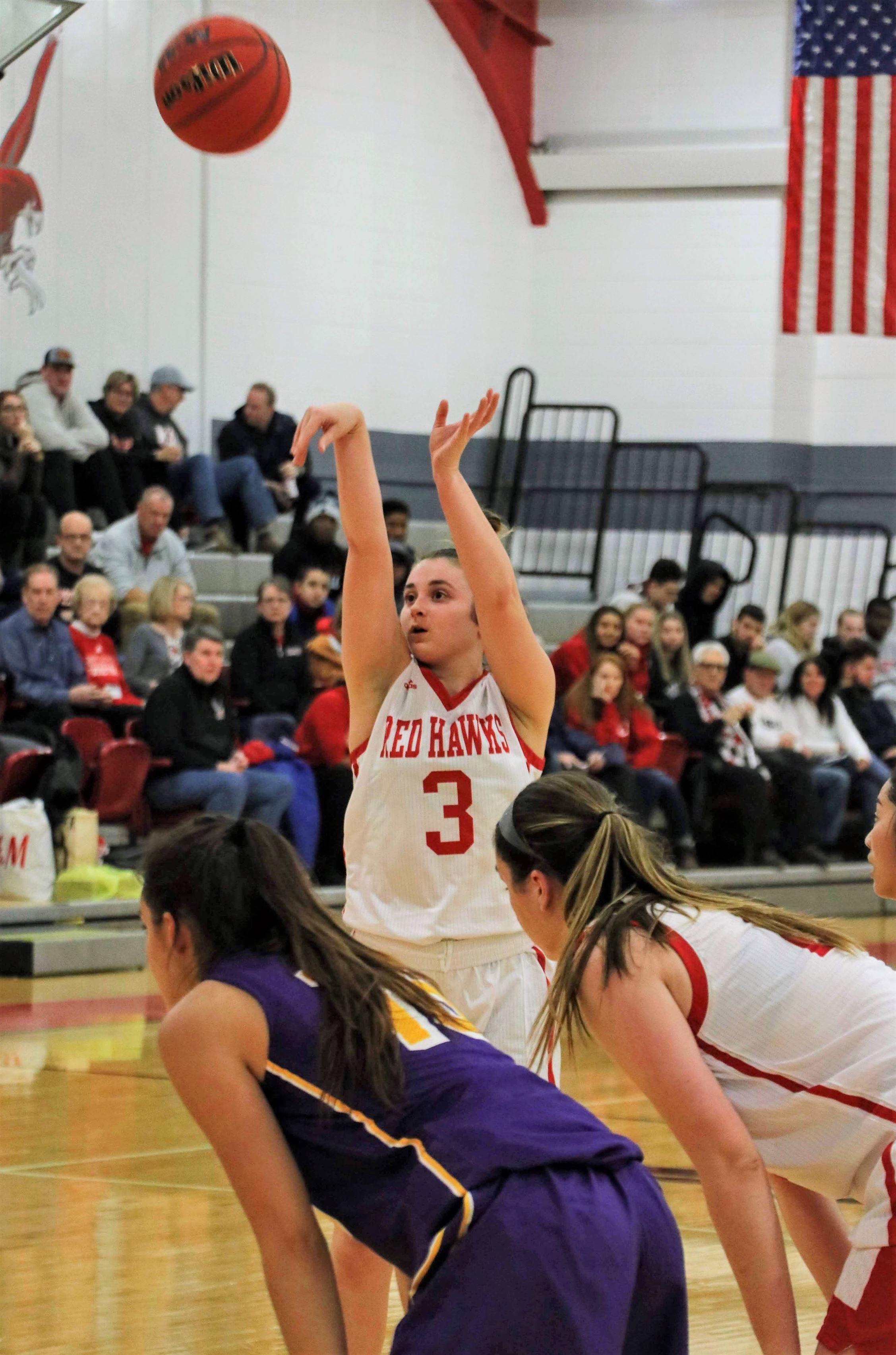
Julia Sutton takes a free throw against Hunter College on Nov. 12, 2019.
Ben Caplan | The Montclarion
Sutton’s individual goals also lineup more with her team goals.
“I definitely just want to help the team out as much as possible and win the NJAC Championship,” Sutton said. “I’ve wanted that for our team since freshman year so I’m excited to be able to get that.”
Harvey is confident that Sutton will contribute in a big way this season, just as much as she contributed off the court last season.
“[Sutton] is an integral part of our program and she will be an integral part of everything that we do this season,” Harvey said.

